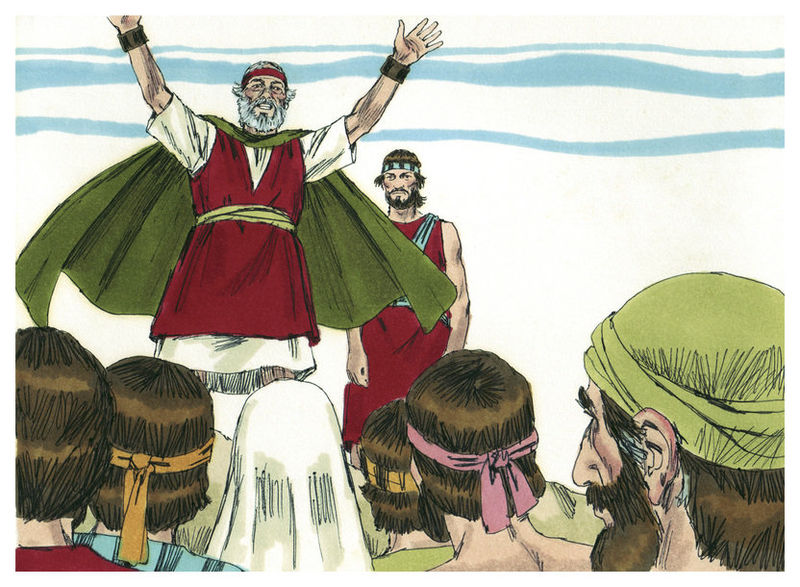Our custom is to read Parshat Devarim right before Tisha B’av. One of the reasons for this custom can be seen through the word “Eicha” which is used sparingly throughout the Tanach. The Book of Lamentations which is read on Tisha B’av begins with this word. “Eicha Yashva Badad”, how has she (i.e. Jerusalem) sat alone, and is thus known as Megillat Eicha. The first time this word is used in the Chumash is found in our Parsha (Devarim 1:12) as Moshe expresses doubt in his ability to lead the nation: “Eicha Esa L’vadi”, how can I bear the burden alone.
We continue this linguistic connection with our choice of HafTorah, Divrei Yeshayahua (Isaiah 1:21), where we meet up with this expression once again. We echo the words of the prophet, as in response to the rampant corruption of his time, Yesha’ayahu bitterly laments: “Eicha Hai’ta L’zona Kirya Ne’emana”, how has this loyal city become like a harlot.
Rav Soloveitchik (M’Pninei HaRav pg. 316) points out that this same word, albeit with a different pronunciation, can be found in the Torah in one previous location.
In Parshat Bereishit, after Adam and Eve had partaken from the tree of knowledge and hidden themselves in shame, the Almighty calls out saying: “Ayeka- where art thou?” (Bereishit 3:8).
The Rav made the following comment: If the hopeful call of Ayeka is not heeded, it then has the potential of becoming transformed into the bitter lamentation of Eicha.
The verse describes how G-d calls out to Adam as he walked in the garden “Leruach Hayom”, and the Midrash (Bereishit Rabba 19:6) discusses whether this takes place at sunrise or sunset. Demonstrating his homiletic prowess, the Rav explained that Ruach Ha’yom, the Zeitgeist surrounding us, can be interpreted as G-d calling out to man- Ayeka! This can take place at either sunrise or sunset, at a time of new beginnings and of hope, or else of failure and despair.
Towards the beginning of the Emancipation, as freedom was extended to all, liberalization was the call of the hour. It was as if a new light had begun to shine on Jewry. And yet, when G-d appeared to ask “Ayeka”, Jews hid from Him – after all, they were now emancipated. Later on, during the period of World War II, a bleak sunset of darkness and calamity, G-d’s cry to mankind was heard again: Ayeka – where art thou. Again, there was no response to G-d’s call, and in lieu of Ayeka the terrible ramifications of “Eicha” were experienced.
Wanting to give this Midrash an Eretz Yisrael spin, we might say the following:
On the eve of the 9th of Av as the spies instilled fear in the hearts of the People of Israel, they began to sob bitterly. Our Sages (Taanit 29a) say that the nation cried that night. The Almighty then had occasion to say, “You cry for naught; needlessly. The time will come when you will have a good reason to cry… (this will be as you witness) the destruction of the Temple”. Night and darkness befell the Jewish people then, just as it did in the 1930’s and 40’s. Did not the expulsion from Spain occur around the 9th of Av? Did not the first World War commence on this day? The Almighty was crying out to the Jewish People: “Ayeka- I am waiting for you in Eretz Yisrael”. Alas, most of the Jewish people were hiding in the Diaspora, refusing to leave.
Rav Teichtel in his “Eim Habanim Semaicha” perceived a direct link between the peoples’ refusal to leave to Eretz Yisrael and the imminent Holocaust. The Ayeka was tragically transformed into Eicha. Now, seventy years later, we are experiencing a period of sunrise as we bask in the light of Hashem’s Chesed. A younger generation has arisen in the Diaspora- a generation who knew not the trauma of the Holocaust. In our Parsha, Moshe stands before such a younger generation, far removed from their parents’ aversion to Eretz Yisrael. Moshe reminds them of the sins of their fathers, beseeching them to not repeat their elders’ mistakes: “Yet you would not go up, but rebelled against the Commandment of the Lord your G-d”, Devarim 1:26-27.
Our present generation is being beckoned as well, we too are being beseeched: “Come home and atone for the sins of your forefathers – Ayeka – where are you?” They couldn’t, or wouldn’t, make Aliyah; you can and should! We must not rebel, we must go up!
RABBI YERACHMIEL RONESS was born and raised in Montreal, Canada. After serving as a congregational Rabbi and as a Hillel Director in New York City, he made Aliyah in 1983 with his wife Dina and their five young children.
Ever since, Rabbi Roness has dedicated his life to promoting Aliyah. First, as Rabbi of the Jewish Agency’s Absorption Centers, and subsequently as the executive director of the Aloh-Naaleh organization.
This article was taken from Rabbi Roness’s new book: Aloh Na’aleh – Eretz Yisrael and Aliyah in the Weekly Parshah.









